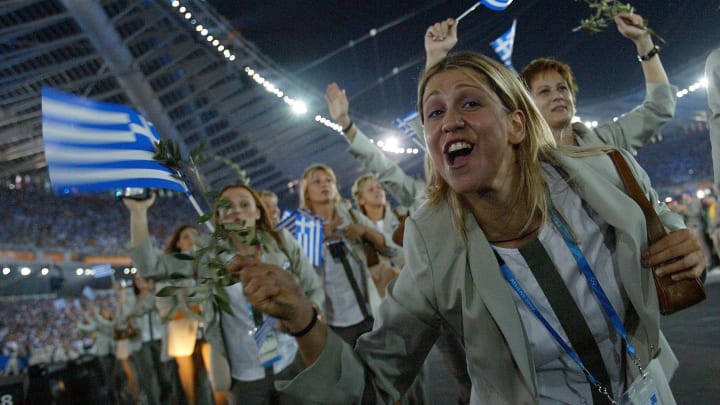SI Vault: A wild journey into Greece's dark, enthralling life on the edge

This story was originally published in the Aug. 2, 2004 issue of Sports Illustrated.
I jam my foot on the gas, wrench the wheel, just miss two men stepping off a curb. The light is red, but who has time for law and order? Cars pour into the intersection around me. Someone beeps; pedestrians glare. My face is a mask of blank arrogance. Isn't the road mine? Am I not a Greek cabdriver? I roll on through as if it's my birthright. I must get to Omonia Square—the traffic-hell plaza squatting at the heart of Athens—to have any hope of reaching Olympia today, and I'll take down anyone in my way. For effect I greet each obstacle with an angry spew of Greek words, though my vocabulary is limited to the polite ordering of a meat sandwich. "Paracalo!" I shout. "Enta'ksi ... souvlaki!" Nothing can stop me. Unless, of course, it's time to go out on strike. That's out of my hands.
I didn't start out this way. No, when I first crept onto Syngrou Avenue, I was your typical tourist adrift in a boxy Hyundai, timid and apologetic. Cars passed me like bullet trains. I gripped a map in one hand and instantly got lost. But then I noticed something odd: People kept waving me over. Not me, exactly, but the canary-yellow car I was driving, the taxi they thought it was. At first I took offense. The 2004 Olympics sparked the construction of new subway lines, highways and tram systems, but an ingrained car culture still strangles Athens, and no group has proven more intractable than the taxi drivers. Resistant to regulation and happy to walk off the job, the city's 15,000 hacks are famous for gouging; the second time I took a cab in Athens, the driver asked for the equivalent of $123 for a $6.50 fare. Called on it, he shrugged as if to say, I'll just get the next sucker.
Still, exactly one month before the opening of the most troubled, most criticized Olympics in history, as city workers feverishly planted trees and shrouded ugly buildings in hopes of presenting a more elegant face to the world, it became clear that meekness would get me nowhere. The day before, a midday blackout short-circuited traffic lights and paralyzed the city. I had to get out fast. Just around Hadrian's Arch my panic was shoved aside by the challenge of Athens's frenetic pace. You want a cab?
"Enta'ksi," I growled—which means "O.K." but sounds like taxi—and nearly laid out three motorbikes while whipping into the left lane. Later I learned that my transformation was quite normal. "At first, like in the U.S., you try to follow the rules," says Marianna Koliopoulos, who emigrated to the U.S. with her husband in 1972 but returns each summer. "But after a while you drive like a Greek. You don't look at the road, you don't really stop at stop signs. It's a little crazy."
Actually, I'm enjoying myself. I nearly collide with a stalled van—sending my notepads, pencils, fruit and water hurtling against the dash—then swerve in front of someone not nearly as quick or clever as I. I consider sparking up a cigarette, whipping out my cellphone, picking up a fare and charging double the rate. Once you embrace it, there's no other sport like driving in Athens. Construction has eaten the city alive, turning mere congestion into what Greek track and field coach Odysseus Papatoulis calls "this madness" of diverted traffic, jackhammered streets and, now, a cleanup effort that will continue until well after the opening ceremonies. One and a half million visitors are expected to descend on the city during the Games, and two million Athenians are expected to flee. Chaos creates a unique rush. As I bull through Omonia's whirlpool of traffic, I heave right, hurled by centrifugal force onto the route to the national highway.
"Para-calo!" I bellow.
SI Vault: Why Ain't I In The Hall? The Cooperstown case for Hack Wilson
I'm heading to Olympia for good reason. On Aug. 18, in the most inspired bid to tap into Olympic history, the shot put will be held there. It's a turn-back-the-clock event for the ages: 1,612 years after their last appearance in Olympia, the Games will return to their birthplace, and no other sporting event will feel more elemental. Tickets will be free, and only water will be sold by concessionaires. The scoreboard will be hand-operated. Winners will receive wreaths made from local olive branches. (They'll get their medals two days later in Athens.)
Olympia will be held up as a profound reminder of the Olympic ideal, the amateurism and simplicity that supposedly animate the Games. Olympia is also a perfect distraction for people like me who are looking for relief from talk of the Games' $7.2 billion price tag, widespread security concerns and general Greek paranoia. Eighty-five percent of the nation supports the return of the Olympics, never mind the cost, but it's not uncommon to hear someone suggest that Greece's stunning victory in the recent Euro 2004 soccer championship was fixed to juice Olympic ticket sales, or to hear Greek officials wax romantic and fearful in the same breath. "I feel great, but I take care," says Rita Papadopoulos, manager of the Olympia venue. "All the people are afraid to go to the metro station. I tell my children, 'Don't go there. I'm afraid. Be careful.'"

Indeed, there are so many nightmare scenarios for these Olympics that the most likely disaster seems quaint: Only 1.8 million of the 5.3 million tickets available have been sold. Considering Greece's small population and depressed tourism, it seems inevitable that at second-tier events there will be gaping holes in the crowds. Greeks insist that their infamous last-minute mentality will kick in and the stands will fill, but then, spontaneity is nearly impossible in Athens now. More than 200,000 people poured out to greet Greece's triumphant soccer team when it returned on July 5, but the celebration was nearly derailed when the team bus got stuck in traffic for three hours.
"We have received a lot of unfair criticism," Athens mayor Dora Bakoyannis told the crowd. "But now, just like at the European Cup, we can prove to the world that when united and determined, the Greeks can achieve anything." She didn't mention that, just as it took a German coach to impose order and unity on the soccer team, it took constant flogging by the International Olympic Committee to get Greece to the finish line. The 35 sports venues should be ready, but just barely. The long-delayed tram system is only now beginning to roll. The new highway to Corinth is broad and smooth, but once you're past the city the road narrows to two lanes. To pass, you swallow hard, straddle the center line and force cars going in both directions to move out of your way. I lock in at 80 mph and follow the parade of maniacs gunning for Patras, Pyrgos and Olympia.
I'm ripe for metaphor, of course, and the 280-mile journey seems all too symbolic. Getting the Olympics back to Olympia has been full of wild twists and white-knuckle moments, but it's easy to envision Aug. 18 as a day in paradise, a momentary cure for Olympic ills. Still, as I get closer, the conceit begins to seem phony. The news is full of doping revelations and disgraced U.S. track stars; what spectator, really, will take at face value anything he sees at these Games?
SI Vault: Huge Commotion in Mudville: A new twist on Casey at the Bat
I park outside the village of Olympia, walk down a deserted road and over an elegant little bridge. The only sound comes from the wind and the clamor of cicadas. People walk gingerly past columns and tumbled stone and eventually stroll under a pocked stone arch and into the stadium. It is, at first sight, stunningly unimpressive: a 190-meter-long patch of dirt with a line of stones embedded at each end, all surrounded by banks of scrubby grass and high pines. On one side of the track stand the ruins of a stone altar; on the other, the remnants of a grandstand. Yet no visitor seems disappointed. One by one they all plant a foot on the starting line, and sometimes a voice yells Go! A father chases his teenage son a few yards, then tumbles laughing into the dust.
Eighteen years ago, a girl named Kalliopi Ouzouni came here on a school trip. There was the usual footrace; she finished third. "I felt wonderful," she says, "but I never imagined I would be a member of the Olympic team." Now the 31-year-old Ouzouni will be one of two Greek women competing in the shot put. "When I understood that the competition could happen in this special place," she says, "it gave me more energy. It made me work harder."
Far from the mess and carping of Athens, Olympia does feel special. More than a third of the local population of 1,800 signed up to help out at the shot put event, and there's no missing the town's unabashed pride.
But what happens if some shot-putter comes up dirty? What if the real overwhelms the ideal? Athens, Olympia and Greece will survive that, too, I realize when I wander out of the stadium and see the line of 16 pedestals. The Greeks have known longer than anyone else that nothing is pure, nothing is new. Here on these pedestals, 16 statues of Zeus once stood, paid for by the fines imposed on cheating athletes, whose names were inscribed as a warning to all who pass.
That's when I know. The 2004 Olympics could be nowhere else but in Greece. No other place better captures the mood of the moment; no other place better represents our low expectations, our fear of the unknown, our hope that, somehow, everything will turn out right. There has never been a civic dash quite like Athens's frantic race to the finish. We're all driving to Olympia now—builders and athletes, cheaters and cheated, hacks and riders alike--all swearing and braking for nothing. Climb in, cross your fingers. I promise: You'll never feel more alive.
